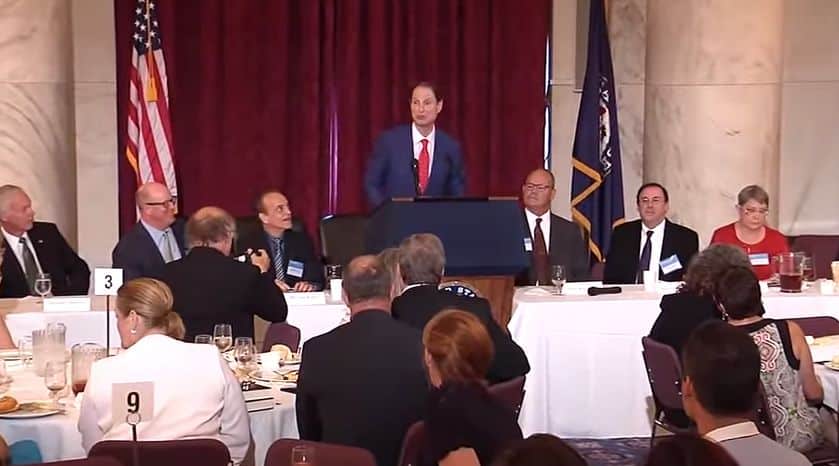On July 30, whistleblowers, advocates, and government officials will gather on Capitol Hill to celebrate National Whistleblower Day. The day continues a tradition of celebrating whistleblowers, which predates the designation of July 30 as National Whistleblower Day.
As whistleblower supporters gear up to celebrate on July 30, WNN looks back on the history of the day and the organized celebrations of whistleblowers.
The First Event
In May 2007, whistleblowers, advocates, and over 50 diverse public interest groups including National Whistleblower Center, the No FEAR Institute, the Government Accountability Project, Doctors for Open Government, Whistleblowers USA, the National Security Whistleblower Coalition, the Veterans Affairs Whistleblower Coalition, the Liberty Coalition, Project On Government Oversight and the Make it Safe Coalition came together from across the United States to celebrate Whistleblower Week in Washington. These groups were united in their support for whistleblowers and commitment to bringing Congressional and public attention to major whistleblower issues and stories via seminars, speeches, training sessions, award ceremonies and panels.
The week was timed to coincide with the fifth anniversary of the May 15, 2002, enactment of the Notification and Federal Employee Anti-discrimination and Retaliation Act of 2002, now known as the No-FEAR Act. This act was a significant step towards protecting whistleblowers, and its anniversary was a fitting occasion to celebrate whistleblowers.
The event boasted a diverse range of attendees and speakers. Whistleblowers from various government agencies and private industry, including the U.S. Department of Agriculture (Linda Lewis), the FBI (Coleen Rowley), Enron (Sherron Watkins), Department of Commerce (Janet Howard, Joyce Megginson, Tanya Ward Jordan), the EPA (Dr. Marsha Coleman-Adebayo), the Army Corps of Engineers (Bunnatine Greenhouse), (Federal Research Fraud) Dr. James Murtagh and Big Tobacco, (Dr. Jeffrey Wigand) and representatives from organizations like the Federal Aviation Administration, No FEAR Coalition, and the National Whistleblower Center.
Similar celebrations took place in 2008 and 2009.
The History Behind July 30
Stephen M. Kohn, Chairman of the National Whistleblower Center, discovered during research that on July 30, 1778, the Continental Congress passed the world’s first whistleblower law.
Kohn discovered documents recounting events that prompted the Continental Congress to act. These documents detail events beginning in the winter of 1777. Without formal legal protections, ten sailors and marines aboard the USS Warren bravely exposed the abuses and misconduct by the Navy commander, Commodore Esek Hopkins. These sailors were arrested and jailed.
From their Providence jail cell, the imprisoned whistleblowers appealed directly to the Continental Congress for assistance. On July 30, 1778, Congress made a landmark decision and unanimously passed the first whistleblower law, a testament to the power and impact of whistleblowing.
The law stated: “That it is the duty of all persons in the service of the United States, as well as all other inhabitants thereof, to give the earliest information of wrongdoing to Congress or other proper authority of any misconduct, frauds or misdemeanors committed by any officers or persons in the service of these states, which may come to their knowledge.
Furthermore, the Continental Congress authorized the release of the whistleblowers’ petitions, even though the information proved sensitive. Congress assumed the financial burden of defending the whistleblowers.
Kohn’s detailed retailing of this history was featured in a June 12, 2011, New York Times op-ed, The Whistle-Blowers of 1777.
National Whistleblower Center Celebrations
Inspired by the events of 1777 and the whistleblower law passed in 1778, uncovered by his research, Kohn reached out to Senate leaders to honor this history. The Senate responded unanimously, passing a resolution designating July 30 as National Whistleblower Appreciation Day. The Senate has passed a similar resolution each year since 2013.
With July 30 officially recognized, the National Whistleblower Center has hosted a celebration in honor of National Whistleblower Day on July 30 since 2015. Videos of past National Whistleblower Day celebrations can be found on NWC’s YouTube channel.
The Fight for Permanent Recognition
In 2023, a group of whistleblowers, led by Whistleblower Network News’ Jane Turner, launched a campaign calling on President Biden to sign an Executive Order permanently establishing July 30 as National Whistleblower Day and requiring all federal agencies to recognize the day. Over 10,000 letters have been sent calling for a permanent National Whistleblower Day.
“The time has come for a culture change, for President Biden to elevate whistleblowers to the status they deserve as people of integrity,” Turner wrote in an op-ed about the campaign. “It is time to support whistleblowers by making National Whistleblower Day permanent. The world needs to know the United States government stands behind whistleblowers, provides recognition, and honors their sacrifices.”
On June 20, Special Counsel Dellinger announced that he is pushing for the permanent recognition of National Whistleblower Day, sending a letter to Congress calling on legislation.
“The establishment of a permanent Whistleblower Appreciation Day reinforces the longstanding bipartisan consensus that whistleblowers serve an invaluable role in our government,” Dellinger said. “By dedicating a day to these brave public servants, we not only honor the contributions of current whistleblowers, but we show potential whistleblowers that their sacrifices will not go unnoticed or unappreciated. And we make clear that retaliation against a whistleblower will not be tolerated.”
